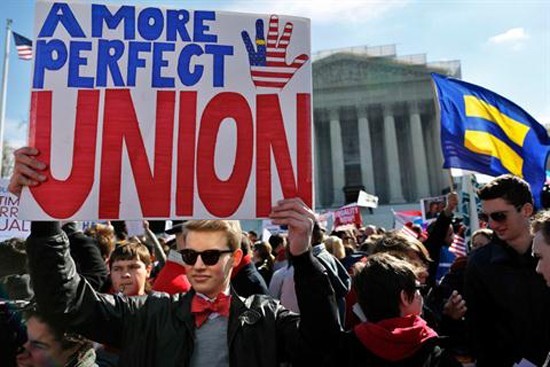
Author: AAP
Publication: The Australian
Publication Date: March 28, 2013
THE US Supreme Court has tackled same-sex unions for a second day, indicating it might throw out a federal law that defines marriage in strictly one-man, one-woman terms.
For nearly two hours, its nine justices questioned the constitutionality of the Defence of Marriage Act (DOMA), with five of them appearing to lean in favour of striking it down.
The controversial 1996 law prevents couples who have tied the knot in nine states – where same-sex marriage is legal – from enjoying the same federal rights and benefits as heterosexual couples.
The plaintiff is Edith Windsor, 83, who was ordered to pay federal inheritance taxes of $US363,000 ($A347,750) following the 2009 death of Thea Spyer, her partner of more than 40 years. The couple had married in Canada in 2007.
The surviving half of a heterosexual couple would not have faced the same tax demand. Windsor is challenging Section 3 of DOMA on the grounds it is discriminatory because it defines marriage as between a man and a woman.
Justice Ruth Ginsburg suggested DOMA represented two kinds of wedlock – “full marriage and skim milk marriage” – while her colleague Elena Kagan said DOMA was “infected by animus, fear and dislike.”
Justice Anthony Kennedy, a conservative whose swing vote on gay and lesbian rights could decide the outcome, said he was “troubled” by how the DOMA case impacted on the rights of states to set out their own marriage laws.
“The justices asked all the questions we expected them to ask,” said Windsor’s lawyer Roberta Kaplan, who declined to speculate on how they would rule in the coming months.
President Barack Obama’s administration initially opposed Windsor’s bid to repeal Section 3 as it progressed through the lower courts, where the law has already twice been ruled unconstitutional.
But the White House has since switched sides. Now it is calling for the law to be overturned, leaving DOMA to be defended by a group of Republican MPs, along with a coalition of religious and conservative groups.
While it will take months to issue a ruling, several Supreme Court justices indicated on Tuesday they would be in no hurry to make a verdict that could extend the right to same-sex marriage to the entire country.
